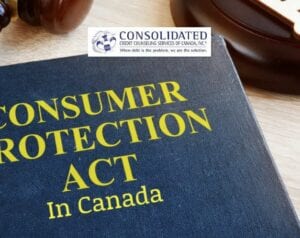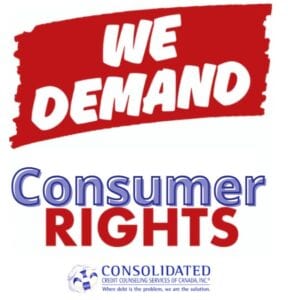Despite the fear that may arise from being contacted by collection agencies, there are rights in place to safeguard you from them. Throughout this article, we’ll be covering your rights, along with some dos and don’ts, when it comes to handling collection agencies.
What happens when debt is sent to a collection agency?
If your debt has been sent to a collection agency, the organization must send you a written notice. The notice must include these details:
- The collection agency’s name
- The name of the bank or company to which you are indebted
- The amount of money that you owe
Keep a record of this information. It’s your first defence against illegitimate companies and claims. Knowing this insight will help you determine if the contact you received is legitimate.
What to do if a collection agency gets your debt?
If a debt collector sends you a notice, do not panic. Outlined below are steps you can take if a debt collector contacts you. They will ensure that your rights are being respected.
Step 1. Keep a record of all communications
It’s important to maintain a thorough record of all the communications that occur between you and a debt collector or agency. This will go a long way to protect you should the collection agency break any laws, you can show which regulations they violated. Take note of the date, time and content of every contact with them. This includes any messages left.
Step 2. Research the debt collector
There are scams that involve pretending to be a debt collector. To avoid getting scammed, research the debt collection agency that has contacted you. Generally, verifying reviews, having a physical office location, and a good rating with the Better Business Bureau are all indicators of a legitimate company. Listed below are warning signs to look out for to protect yourself from fraudulent collection agencies.
- Use high pressure to get you to agree to send them money.
- Say you may go to jail if you don’t pay your debt.
- Threaten to contact your loved ones to speak to them about your debt.
- Demand you give them sensitive information like your social insurance number.
Step 3. Contact the debt collector
If a debt collector contacts you, while you may want to ignore them, it’s always in your best interest to speak to them. The first conversation is by far the most important. This conversation is when you want to verify the debt information they have. It’s critically important that you DO NOT agree that it’s your debt until you’ve verified the information is correct. If you accidentally agree and the information is incorrect you could be held responsible for what you have agreed to. At the very least, it will be a difficult road ahead clearing this up. This is the point at which to clear up any differences in your debt records and prevent future errors or misunderstandings.
Step 4. Negotiate repayment
If everything checks out after verifying the information they have, start a conversation about repayment. Early on in the process, especially, collection agencies will typically, be willing to negotiate the terms of repayment. Whether it’s a timeline, amount, or both. Follow these terms, and if you’re unable to, contact them as soon as possible. Being transparent and cooperative is how you’ll navigate through the experience as easily as possible. It’s only when becoming uncooperative that you’ll find your options dwindle and an increase in annoyances, such as numerous calls, occur.
How does your credit score change if you have debt in collections?
Once your debt has been sent to collections, your credit score will reduce drastically. This can make it difficult to secure a loan or a low-interest credit card in the future. Your ability to rent a new apartment or purchase a home may also be hindered. It will also affect your chances of getting a job that requires a security clearance.
Settling debts with a collection agency
It is possible for you to negotiate with a collection agency to repay your debts. You can ask them if they’ll accept a lower amount as a debt settlement. It’s worth trying to negotiate a mutually beneficial agreement. When negotiating a payment plan, consider your current income and household expenses. If you’re uncomfortable negotiating, seek advice from a financial advisor or a credit counsellor.
What to do when the debt isn’t mine?
There are three steps to take when it comes to a collection agency contacting you about a debt that’s not yours.
- Explain to the collections agency that it’s not your debt.
- Contact the creditor that released the debt to the collections agency to clear up the error.
- Verify that the information has not been listed on your credit report.
When can a debt collector contact me?
Contrary to some people’s belief, a debt collector can’t reach out to you at any time. Here in Canada, there are regulations around when collection agencies may contact you. Below is a list of rules legitimate agencies should follow.
- They are permitted to call you on Sundays between the hours of 1 pm and 5 pm.
- Monday through Saturday between 7 am and 9 pm are also permitted.
- Collection agencies are not allowed to contact you on holidays.
- Debt collectors may not make calls to residents of Quebec on Sundays.
- They are prohibited from contacting you more than 3 times a day if you live in Ontario, Nova Scotia, or Alberta.
Dos and don’ts when a collection agency calls
DO
- Find out the creditor’s identity, the amount owed, and the specific time period they are referring to.
- Ask them to mail you a written verification of the debt that includes; the debt amount, the creditor’s name, and expresses that you have 30 days to dispute the debt.
- Use the time until the written notice arrives to review your finances and figure out a way to handle the debt based on your financial situation.
DON’T
- Ignore a collection agency call or notice.
- Disclose your financial information on the phone.
- Acknowledge the debt until you confirm its authenticity.
Who a debt collector is allowed to talk to
A debt collector is allowed to contact you about your debt or anyone who has cosigned the loan with you. If you haven’t granted them permission, your debt collector is prohibited from discussing your debt with your friends or family. However, they may contact your loved ones to get your contact information, such as your telephone number or email address. The debt collector is also allowed to contact your place of employment to verify that you work there.
Who can I speak to if a debt collector has violated my rights?
The Financial Consumer Agency of Canada (FCAC) is an organization that protects the rights of Canadian consumers of financial products and services. The FCAC offers safeguards for consumers that prevent debt collectors from harassing debtors, revealing debts to third parties, and other violations. If you believe that a debt collector has violated your rights, you can file a complaint with the FCAC.
What is a debt collector not allowed to do
The FCAC outlines and upholds regulations regarding debt collection. Familiarizing yourself with the limitations and guidelines set forth by this organization can empower you when dealing with debt collectors. Listed below are some of these regulations.
Debt collectors:
- Must adhere to the permitted times outlined by the FCAC.
- Cannot give false or misleading information.
- Must not use threatening or profane language when they contact you.
- Are not permitted to contact your loved ones about your debt.
- Cannot put excessive stress on you to pay your debt.
- Are prohibited from calling you unless you have previously provided them with your phone number as a means of contact.
- Must not pressure your friends and family to pay your debt unless one of them has cosigned on it.
How to complain about a debt collector
Firstly, to complain about a debt collector, gather all relevant information about your interaction, including dates, times, and the nature of the communications. You can then use that information to file a complaint with the FCAC online or by phone. The FCAC can assist you in resolving any concerns that may arise with the collections agency.
Can I pay back the original creditor once a debt goes to collections?
You cannot settle debt with the original creditor once a collection agency has it. The collection agency has bought your debt. Making it legally theirs. You will need to work with them to settle your debts or negotiate a payment plan. To minimize the impact on your credit score, it’s advisable to contact your original creditor to settle your debt before it goes to collections.
How long can collections come after me?
The statute of limitations for debt collection varies from province to province and typically ranges from 2 to 6 years for most types of debt. However, this period can be longer for certain debts, like mortgages or student loans. Once this period expires, a collection agency can no longer legally sue you to collect the debt, but they might still attempt to contact you to seek payment.
These are the timeframes for each province:
- Ontario: 2 years
- New Brunswick: 2 years
- Nova Scotia: 2 years
- Prince Edward Island: 6 years
- Quebec: 3 years
- Manitoba: 2 years
- Saskatchewan: 2 years
- Alberta: 2 years
- British Columbia: 2 years
- Yukon: 6 years
- Northwest Territories: 6 years
- Nunavut: 6 years
Key takeaways
- If you’re contacted by collections, it’s important not to agree that it’s your debt until you are absolutely sure.
- The more transparent and cooperative you are with a collections agency the less hassle and better terms they will offer you.
- There are a number of regulations collection agencies must follow, including permitted contact times, who they can contact, and how they must conduct themselves when conversing. Knowing them will protect your rights.
- The FCAC is the regulating authority when it comes to debt collection.
- Keep a thorough record of the dates, times and content of every contact with a collections agency.
FAQ
Can a debt collector use a fake name when they call me?
It is illegal for a debt collector or a collections agency to use a fake name when they contact you. If they do this, they would violate the laws set by the FCAC. This could get them in serious trouble with the Federal government.
What happens if I ignore the debt collector?
You can choose to ignore a debt collector for a while. However, doing so has negative consequences. The collection agency might sue you to recover their money. They could also request a court to garnish your wages. To avoid these threatening outcomes, you must find a way to negotiate or settle your debts with the debt collector.
How do collection agencies work? How do they make money?
Generally, there are two ways collections agencies make money.
Credit lenders or creditors hire them to recover funds from past-due accounts or accounts in default. In this case, they receive a portion of the funds they recovered.
They also purchase the debt at a reduced price (sometimes even for pennies) and earn money by getting the debtor to repay the full amount they owe. The difference between how much they paid for the debt and how much they recover being their profit.
Is it allowed for a debt collector to discuss my debts with my spouse?
A debt collector cannot discuss your debt with your spouse unless they possess a cosigned loan, or you have given them permission. Take these actions if your spouse is contacted about your debt.
Inform your spouse to let the collector know they are not allowed to speak with them. Advise your spouse to calmly inform the debt collector that their actions are illegal, which may stop them from calling again. If the issue persists, consider filing a complaint with the FCAC.
Final thoughts
As the saying goes, your best defence is a good offence. Prevent your debt from getting into the hands of a debt collector by handling it before it gets out of control. One of our trained credit counsellors can help you come up with a plan to do just that.





